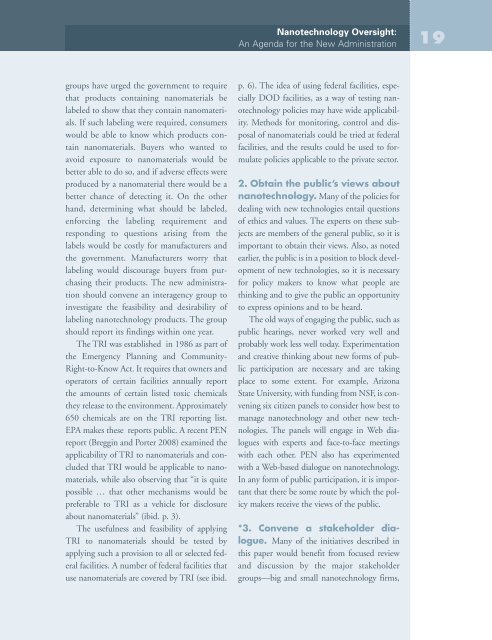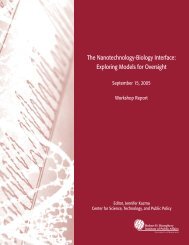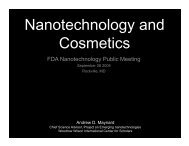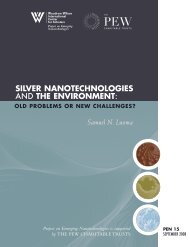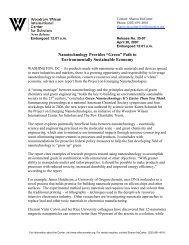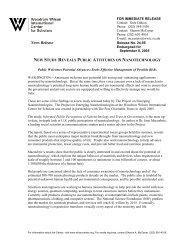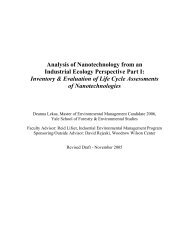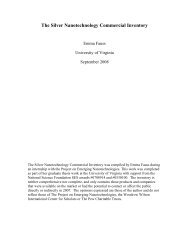nanotechnology oversight - Project on Emerging Nanotechnologies
nanotechnology oversight - Project on Emerging Nanotechnologies
nanotechnology oversight - Project on Emerging Nanotechnologies
You also want an ePaper? Increase the reach of your titles
YUMPU automatically turns print PDFs into web optimized ePapers that Google loves.
Nanotechnology Oversight:<br />
An Agenda for the New Administrati<strong>on</strong><br />
19<br />
groups have urged the government to require<br />
that products c<strong>on</strong>taining nanomaterials be<br />
labeled to show that they c<strong>on</strong>tain nanomaterials.<br />
If such labeling were required, c<strong>on</strong>sumers<br />
would be able to know which products c<strong>on</strong>tain<br />
nanomaterials. Buyers who wanted to<br />
avoid exposure to nanomaterials would be<br />
better able to do so, and if adverse effects were<br />
produced by a nanomaterial there would be a<br />
better chance of detecting it. On the other<br />
hand, determining what should be labeled,<br />
enforcing the labeling requirement and<br />
resp<strong>on</strong>ding to questi<strong>on</strong>s arising from the<br />
labels would be costly for manufacturers and<br />
the government. Manufacturers worry that<br />
labeling would discourage buyers from purchasing<br />
their products. The new administrati<strong>on</strong><br />
should c<strong>on</strong>vene an interagency group to<br />
investigate the feasibility and desirability of<br />
labeling <str<strong>on</strong>g>nanotechnology</str<strong>on</strong>g> products. The group<br />
should report its findings within <strong>on</strong>e year.<br />
The TRI was established in 1986 as part of<br />
the Emergency Planning and Community-<br />
Right-to-Know Act. It requires that owners and<br />
operators of certain facilities annually report<br />
the amounts of certain listed toxic chemicals<br />
they release to the envir<strong>on</strong>ment. Approximately<br />
650 chemicals are <strong>on</strong> the TRI reporting list.<br />
EPA makes these reports public. A recent PEN<br />
report (Breggin and Porter 2008) examined the<br />
applicability of TRI to nanomaterials and c<strong>on</strong>cluded<br />
that TRI would be applicable to nanomaterials,<br />
while also observing that “it is quite<br />
possible … that other mechanisms would be<br />
preferable to TRI as a vehicle for disclosure<br />
about nanomaterials” (ibid. p. 3).<br />
The usefulness and feasibility of applying<br />
TRI to nanomaterials should be tested by<br />
applying such a provisi<strong>on</strong> to all or selected federal<br />
facilities. A number of federal facilities that<br />
use nanomaterials are covered by TRI (see ibid.<br />
p. 6). The idea of using federal facilities, especially<br />
DOD facilities, as a way of testing <str<strong>on</strong>g>nanotechnology</str<strong>on</strong>g><br />
policies may have wide applicability.<br />
Methods for m<strong>on</strong>itoring, c<strong>on</strong>trol and disposal<br />
of nanomaterials could be tried at federal<br />
facilities, and the results could be used to formulate<br />
policies applicable to the private sector.<br />
2. Obtain the public’s views about<br />
<str<strong>on</strong>g>nanotechnology</str<strong>on</strong>g>. Many of the policies for<br />
dealing with new technologies entail questi<strong>on</strong>s<br />
of ethics and values. The experts <strong>on</strong> these subjects<br />
are members of the general public, so it is<br />
important to obtain their views. Also, as noted<br />
earlier, the public is in a positi<strong>on</strong> to block development<br />
of new technologies, so it is necessary<br />
for policy makers to know what people are<br />
thinking and to give the public an opportunity<br />
to express opini<strong>on</strong>s and to be heard.<br />
The old ways of engaging the public, such as<br />
public hearings, never worked very well and<br />
probably work less well today. Experimentati<strong>on</strong><br />
and creative thinking about new forms of public<br />
participati<strong>on</strong> are necessary and are taking<br />
place to some extent. For example, Ariz<strong>on</strong>a<br />
State University, with funding from NSF, is c<strong>on</strong>vening<br />
six citizen panels to c<strong>on</strong>sider how best to<br />
manage <str<strong>on</strong>g>nanotechnology</str<strong>on</strong>g> and other new technologies.<br />
The panels will engage in Web dialogues<br />
with experts and face-to-face meetings<br />
with each other. PEN also has experimented<br />
with a Web-based dialogue <strong>on</strong> <str<strong>on</strong>g>nanotechnology</str<strong>on</strong>g>.<br />
In any form of public participati<strong>on</strong>, it is important<br />
that there be some route by which the policy<br />
makers receive the views of the public.<br />
*3. C<strong>on</strong>vene a stakeholder dialogue.<br />
Many of the initiatives described in<br />
this paper would benefit from focused review<br />
and discussi<strong>on</strong> by the major stakeholder<br />
groups—big and small <str<strong>on</strong>g>nanotechnology</str<strong>on</strong>g> firms,


